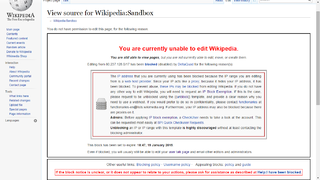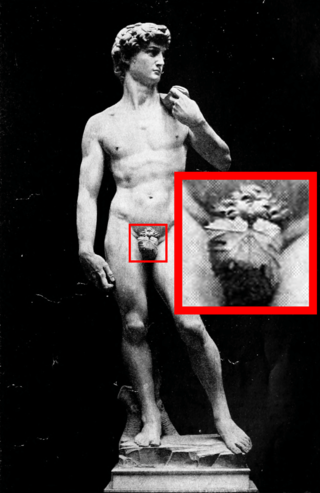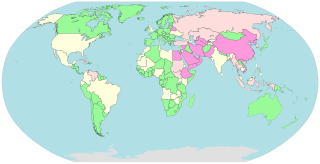Related Research Articles
Internet censorship in the People's Republic of China (PRC) affects both publishing and viewing online material. Many controversial events are censored from news coverage, preventing many Chinese citizens from knowing about the actions of their government, and severely restricting freedom of the press. Such measures, including the complete blockage of various websites, inspired the policy's nickname, the "Great Firewall of China", which blocks websites. Methods used to block websites and pages include DNS spoofing, blocking access to IP addresses, analyzing and filtering URLs, packet inspection, and resetting connections.

IP address blocking, or IP banning, is a configuration of a network service that blocks requests from hosts with certain IP addresses. IP address blocking is commonly used to protect against brute force attacks and to prevent access by a disruptive address. IP address blocking can be used to restrict access to or from a particular geographic area, for example, the syndication of content to a specific region through the use of Internet geolocation and blocking.
The Great Firewall is the combination of legislative actions and technologies enforced by the People's Republic of China to regulate the Internet domestically. Its role in internet censorship in China is to block access to selected foreign websites and to slow down cross-border internet traffic. The Great Firewall operates by checking transmission control protocol (TCP) packets for keywords or sensitive words. If the keywords or sensitive words appear in the TCP packets, access will be closed. If one link is closed, more links from the same machine will be blocked by the Great Firewall. The effect includes: limiting access to foreign information sources, blocking foreign internet tools and mobile apps, and requiring foreign companies to adapt to domestic regulations.
Censorship in South Korea is implemented by various laws that were included in the constitution as well as acts passed by the National Assembly over the decades since 1948. These include the National Security Act, whereby the government may limit the expression of ideas that it perceives "praise or incite the activities of anti-state individuals or groups". Censorship was particularly severe during the country's authoritarian era, with freedom of expression being non-existent, which lasted from 1948 to 1993.
Multiple forms of media including books, newspapers, magazines, films, television, and content published on the Internet are censored in Saudi Arabia.

Internet censorship is the legal control or suppression of what can be accessed, published, or viewed on the Internet. Censorship is most often applied to specific internet domains but exceptionally may extend to all Internet resources located outside the jurisdiction of the censoring state. Internet censorship may also put restrictions on what information can be made internet accessible. Organizations providing internet access – such as schools and libraries – may choose to preclude access to material that they consider undesirable, offensive, age-inappropriate or even illegal, and regard this as ethical behaviour rather than censorship. Individuals and organizations may engage in self-censorship of material they publish, for moral, religious, or business reasons, to conform to societal norms, political views, due to intimidation, or out of fear of legal or other consequences.

Iran is notable for its degree of government-sponsored internet censorship. As of 2012, the country blocks approximately 27% of internet sites and as of 2013, blocks half of the top 500 visited websites worldwide. The Iranian government and Islamic Revolutionary Guard Sepah also block several social media and communications platforms, including YouTube, Facebook, Twitter, Blogger, Telegram, Snapchat, Medium. The government also blocks some streaming services, including Netflix and Hulu. Sites relating to health, science, sports, news, pornography and shopping are also routinely blocked.

Censorship is the suppression of speech, public communication, or other information. This may be done on the basis that such material is considered objectionable, harmful, sensitive, or "inconvenient". Censorship can be conducted by governments, private institutions and other controlling bodies.
Internet censorship in Vietnam prevents access to websites critical of the Vietnamese government, expatriate political parties, and international human rights organizations, among others or anything the Vietnamese government does not agree with. Online police reportedly monitor Internet cafes and cyber dissidents have been imprisoned. Vietnam regulates its citizens' Internet access using both legal and technical means. The government's efforts to regulate, monitor, and provide oversight regarding Internet use has been referred to as a "Bamboo Firewall". However, citizens can usually view, comment and express their opinions civilly on the internet, as long as it does not evoke anti-government movement, political coup and disrupt the social stability of the country.
In Italy, freedom of press is guaranteed by the Constitution of 1948. This freedom was specifically established in response to the Censorship in Italy which occurred during the fascist regime of Benito Mussolini (1922–1945). Censorship continues to be an issue of debate in the modern era.
This list of Internet censorship and surveillance by country provides information on the types and levels of Internet censorship and surveillance that is occurring in countries around the world.

Internet censorship in South Korea is prevalent, and contains some unique elements such as the blocking of pro-North Korea websites, and to a lesser extent, Japanese websites, which led to it being categorized as "pervasive" in the conflict/security area by OpenNet Initiative. South Korea is also one of the few developed countries where pornography is largely illegal, with the exception of social media websites which are a common source of legal pornography in the country. Any and all material deemed "harmful" or subversive by the state is censored. The country also has a "cyber defamation law", which allow the police to crack down on comments deemed "hateful" without any reports from victims, with citizens being sentenced for such offenses.
Internet censorship circumvention is the use of various methods and tools to bypass internet censorship.

The cute cat theory of digital activism is a theory concerning Internet activism, Web censorship, and "cute cats" developed by Ethan Zuckerman in 2008. It posits that most people are not interested in activism; instead, they want to use the web for mundane activities, including surfing for pornography and lolcats. The tools that they develop for that are very useful to social movement activists because they may lack resources to develop dedicated tools themselves. This, in turn, makes the activists more immune to reprisals by governments than if they were using a dedicated activism platform, because shutting down a popular public platform provokes a larger public outcry than shutting down an obscure one.

Internet censorship in the Russian Federation is enforced on the basis of several laws and through several mechanisms. Since 2012, Russia maintains a centralized internet blacklist maintained by the Federal Service for Supervision of Communications, Information Technology and Mass Media (Roskomnadzor).
GreatFire (GreatFire.org) is a website that monitors the status of websites censored by the Great Firewall of China and helps Chinese Internet users circumvent the censorship and blockage of websites in China. Through an investigation by the Associated Press, the website was found receiving funds from the United States government through its Open Technology Fund under Radio Free Asia.

The Cyberspace Administration of China is the central internet regulator, censor, oversight, and control agency for the People's Republic of China. Under the arrangement "one institution with two names", it is the external brand name of the Office of the Central Cyberspace Affairs Commission of the Chinese Communist Party.

Domain fronting is a technique for Internet censorship circumvention that uses different domain names in different communication layers of an HTTPS connection to discreetly connect to a different target domain than is discernable to third parties monitoring the requests and connections.
Sendika.org is an alternative news website known for providing viewpoints now widely censored in Turkey under the Erdogan government. According to Reporters Without Borders, whose Collateral Freedom project offered to mirror the site,
It aims to serve as a mouthpiece for those without a voice and to cover stories ignored by mainstream media – including social issues, the Kurdish issue, and the women’s and LGBT movements. Recognized as a leading source of news about the crackdown on the Occupy Gezi movement in 2013, it has also provided cutting-edge reporting on many other sensitive stories such air strikes against civilian targets in Roboski, the Soma coalmine explosion, rioting linked to the siege of Kobane, President Erdogan’s Syria policy and clashes in the southeast.

This list of Internet censorship and surveillance in Asia provides information on the types and levels of Internet censorship and surveillance that is occurring in countries in Asia.
References
- ↑ Robinson, David; Yu, Harlan; An, Anne. "Collateral Freedom - A Snapshot of Chinese Internet Users Circumventing Censorship" (PDF). Open Internet Tools Project. Archived from the original (PDF) on 2013-07-18. Retrieved 28 December 2016.
- ↑ "Collateral Freedom FAQ | GreatFire Analyzer". en.greatfire.org. Retrieved 2017-01-04.
- ↑ "Greatfire - Expanding Collateral Freedom | Open Technology Fund". www.opentech.fund. Retrieved 2017-01-04.
- ↑ Weaver, Nicholas (5 June 2015). "How China's 'Great Cannon' works". CNN. Retrieved 2017-01-04.
- ↑ Hern, Alex (2016-04-14). "GreatFire activist urges western firms to help end Chinese censorship". The Guardian. ISSN 0261-3077 . Retrieved 2017-01-04.
- ↑ Russell, Jon (30 March 2015). "These Activists Are Plotting To End Internet Censorship In China". TechCrunch. Retrieved 2017-01-04.
- ↑ "Collateral Freedom – how we are doing it | Collateral Freedom". 12mars.rsf.org. Reporters Without Borders. Archived from the original on 2017-01-04. Retrieved 2017-01-04.
- ↑ "Reporters Without Borders unblocks access to censored websites". BetaNews. 2015-03-12. Retrieved 2017-01-04.
- ↑ "Internet activists are finding ways around China's Great Firewall". Washington Post. Retrieved 2017-01-04.